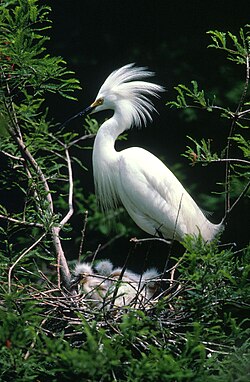Herons are wading birds in the Ardeidae family. There are 64 recognised species in this family. Some are called egrets or bitterns instead of herons.
| Herons | |
|---|---|

| |
| Snowy egret, Egretta thula, with chicks | |
| Scientific classification | |
| Kingdom: | |
| Phylum: | |
| Class: | |
| Subclass: | |
| Superorder: | |
| Order: | |
| Family: | Ardeidae Leach, 1820
|
In the family, all members of the genera Botaurus and Ixobrychus are called bitterns: they are a monophyletic group within the Ardeidae.[1]
On the other hand, egrets are not a biologically distinct group. They are called egrets because they are mainly white and/or have decorative plumes. Although egrets have the same build as the larger herons, they tend to be smaller.
The classification of the individual heron/egret species is difficult, and there is no clear consensus about the placement of many species into either of the two major genera, Ardea and Egretta.
Although herons look like birds in some other families, such as the storks, ibises and spoonbills, they differ from these in flying with their necks retracted, not outstretched. They are also one of the bird groups that have 'powder down'.
Some members of this group nest colonially in trees; others, notably the bitterns, use reedbeds.
Other examples:
References
change- ↑ Martínez-Vilalta, Albert; Motis, Anna 1992. "Family Ardeidae (Herons)" in del Hoyo, Josep; Elliott, Andrew; Sargatal, Jordi: Handbook of the Birds of the World. Volume 1, Ostriches to Ducks. Barcelona: Lynx Editions. pp376–403 ISBN 978-84-87334-10-8